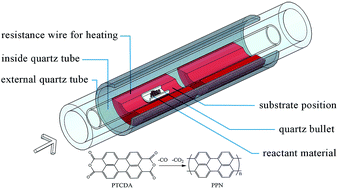PPN (poly-peri-naphthalene) film as a narrow-bandgap organic thermoelectric material†
Abstract
A narrow-bandgap semiconducting thin film of poly-peri-naphthalene (PPN) has been synthesised via the pyrolysis of 3,4,9,10-perylenetetracarboxylic dianhydride (PTCDA). By tuning the pyrolysis temperature, the bandgap of the PPN film can be adjusted from 0.37 to 0.26 eV. Optimised thermoelectric performance can be achieved at the pyrolytic temperature of 600 °C, at which the power factor reached up to 0.43 μW m−1 K−2, with a Seebeck coefficient of 47 μV K−1 and an electrical conductivity of 1.85 S cm−1. IR and Raman spectra indicate that the structure of the pyrolytic film is similar to that of multilayer graphene or graphene nanoribbons with a narrow bandgap. Since the PPN film has the advantages of a tunable bandgap, low cost, feasibility for large-area fabrication, thermal and chemical stability, and a relatively high performance without further modification, it is a promising carbon-based thermoelectric material and is worth further investigations.



 Please wait while we load your content...
Please wait while we load your content...